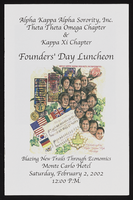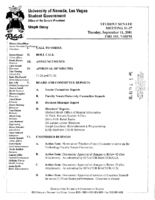Search the Special Collections and Archives Portal
Search Results
Blanche Zucker-Bozarth Papers
Identifier
Abstract
The Blanche Zucker-Bozarth Papers document education advocate Blanche Zucker-Bozarth's volunteer work and activism in libraries, children's advocacy, and women’s clubs in Las Vegas, Nevada from 1963 to 2005. The collection includes records, newspaper clippings, and photographs from her political activism and fundraising initiatives in Southern Nevada. The collection also includes buttons, video tapes, and journal articles on child abuse prevention, as well as records from Zucker-Bozarth's term as president of the Mesquite Club in the 1980s.
Archival Collection
Nevada Desert Experience Records
Identifier
Abstract
The Nevada Desert Experience Records (1951-2009) are comprised of files from the anti-nuclear organization, the Nevada Desert Experience (NDE), as well as its predecessor, the Sagebrush Alliance, and those of earlier unincorporated protests at the Nevada Test Site (NTS). Materials include board of directors meeting minutes, financial records, scrapbooks, personnel records, event speeches, correspondence, newspaper clippings, cartoons and other artwork, newsletters, brochures, fliers, research files on nuclear issues and other anti-nuclear organizations, and congressional testimony. The records also contain audiovisual materials, photographic prints and slides, screenplays, manuscripts, and newspapers related to the NDE's media efforts.
Archival Collection
UNLV University Libraries Collection on Nevada Mining
Identifier
Abstract
The Nevada Mining Collection is comprised of records that document mining and mines in Nevada from 1842 to 1966. The majority of the collection includes records of various mines and mining companies located in the Esmeralda, Lincoln, Clark, White Pine, and Nye counties, dating from 1900 to 1928. The collection includes financial, administrative, and business related records; photographs of miners, mining camps, and towns; correspondence; maps; newspaper clippings, pamphlets, newsletters, and booklets.
Archival Collection

Alpha Kappa Alpha Sorority, Theta Theta Omega Chapter Founders' Day committee reports
Date
Archival Collection
Description
From the Alpha Kappa Alpha Sorority, Incorporated, Theta Theta Omega Chapter Records (MS-01014) -- Chapter records file.
Text

Meeting minutes for Consolidated Student Senate, University of Nevada, Las Vegas, September 11, 2001
Date
Archival Collection
Description
Text

Steve Jones and Bart Jones interview, Novermber 7, 2016: transcript
Date
Archival Collection
Description
Brothers Steve and Bart Jones live and breathe Las Vegas history. Their grandparents, Burley and Arlie Jones, arrived in Las Vegas in the nineteen-teens; their father, Herb Jones; his sister, Florence Lee Jones Cahlan, and their uncle, Cliff Jones, helped form the legal, journalistic, and water policy framework that sustains Southern Nevada today. The Jones brothers build on that foundation through their custom home-building company, Merlin Construction. In this interview, they talk about living and growing up in Las Vegas, of attending John S. Park Elementary School, of hunting in the desert, of their family's commitment to cultural and racial diversity, and of accompanying their grandfather to his business at the Ranch Market in the Westside. They share their early work experiences lifeguarding and later, dealing, at local casinos as well as second-hand memories of the Kefauver trials through the tales told by their father and uncle. Steve describes mentor Audie Coker; he explains
Text

Transcript of interview with Dorothy Kelsey by James M. Greene, January 20, 1975
Date
Archival Collection
Description
On January 20, 1975, collector James M. Greene interviewed housewife, Dorothy Kelsey (born May 28, 1916 in Kingman, Arizona) in her home in Nelson, Nevada. This interview covers the early days of Nelson, Searchlight, and Las Vegas, as Mrs. Kelsey offers an in-depth personal narrative on the life of a local old-timer. The interview concludes with a discussion on hotels and casinos.
Text

Transcript of interview with Mitchell A. Cobeaga by Raymond E. Frey, March 14, 1976
Date
Archival Collection
Description
On March 14, 1976 Raymond E. Frey interviewed Vice President of Nevada State Bank, Mitchell A. Cobeaga (born December 11, 1917 in Lovelock, Nevada) at Mr. Frey’s home in Las Vegas, Nevada. This interview covers early life in Nevada and the history of the Nevada State Bank. During this interview Mr. Cobeaga also discusses education in Nevada in the twenties and thirties, and Southern Nevada’s influence over the rest of the state.
Text

Transcript of interview with Daisy Lee Miller by Claytee White, March 22, 2013
Date
Archival Collection
Description
Daisy Lee Miller talks about being born and raised as an only child in Louisiana before moving to Las Vegas in her 20s. For a time, Daisy worked in the powder room at the California Club. It was while she was employed here that she realized she wanted something better, and she wanted to be a good example tor her kids. Daisy began attending the University of Nevada, Las Vegas to get her degree. Daisy is very proud of the fact that she graduated from UNLV at the same time that her daughter graduated from high school. Family has always been very important to Daisy, and she enjoyed spending time with her children while they were growing up. Sundays always found Daisy and her children at church while other leisure-time activities included trips to the lake or Mt. Charleston. While going to school, Daisy worked at the Economic Opportunity Board in the family planning program. Following graduation, Daisy began working for the Clark County School District where she rapidly advanced
Text
Vera Moore (True Beginnings/Divinity House) oral history interview conducted by Kelliann Beavers and Elia Del Carmen Solano-Patricio: transcript
Date
Archival Collection
Description
From the Lincy Institute "Perspectives from the COVID-19 Pandemic" Oral History Project (MS-01178) -- Community organization interviews file.
Text
